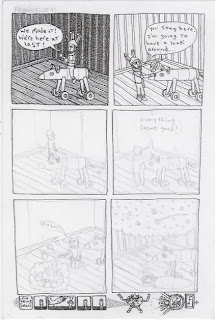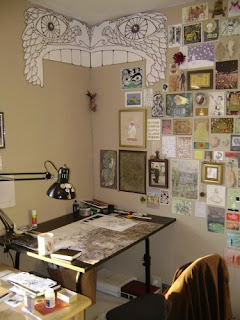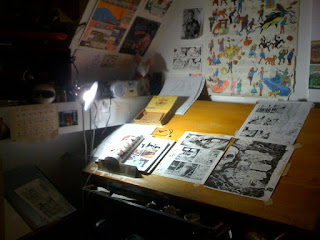
Nate Doyle is a dear friend of mine. We work together at Forbidden Planet, a comic store in Manhattan. Talking with Nate about art has helped me through more insecure moments with my own work then I can count. While the artwork I make couldn't be more different then Nate's, we both love comics in the same way. My own love for all types of drawing and cartooning seems more sane when I talk about it with him...he's one of the few people that is equally excited about Dragon ball Z AND the most avant mini comic currently making the rounds. Working where we do, we're constantly surrounded by drawings. Nate really helped me appreciate this and let it seep into my art.
Nate is also an incredible artist---I hesitate to even mention our friendship in fear of obscuring my admiration for his talent. Nate, I think, is a wonderful storyteller. When i look at his work, I can't help but read it. It reads itself...and this is in spite of its often heavy brushwork. usually, the only comics that read effortlessly to me look like Tintin---thin lines. Nate's work is thick, but still reads so easily. I also get out of Nate's work what I get out of Blutch: such enthusiasm for drawing that you cant help but want to make comics yourself right away.
You can find out more about Nate's work here:
http://ndcrookedteeth.blogspot.com/
His minis are available through Sparkplug Comics Distro. The Archer was called one of the best minis of the year by Fantagraphics' Eric Reynolds.
1. can you describe your drawing routine---how often you draw, how many hour per day---how you break up the day with drawing?
Usually I'll either plan on doing some work, or spontaneously decided that I'm going to draw, paint, etc. once home from work, or finished reading or something like that, I make an attempt to draw or do a comic everyday, but realistically that never happens, so I try to at least do something in my sketchbook. I usually start with something in mind, either from what happened during the day, a song or from something I just read and then go from there. Most of the time my drawing just consists of getting out of habits and actually looking and thinking about what it is I'm actually drawing. When I really get some momentum I can draw easily for hours, I kind of lose track of time, but probably an average of two or three hours when I do get some work in. I'll wake up get some food, put on a record and go, or when I get home from work later in the day I'll just plop down in front of the desk and escape from retail jail...
2. how much revision/editing do you do in you work?
A lot of that I guess, I tend to ask for opinions or show my work while its in the process to get a better idea of how people are going to read the comic, if there are story telling issues, what doesn't work for the drawing and so on. With a longer story I usually revise the thumbnails two times, and cut or add panels where it seems like the story and panel composition will benefit. As for illustration or just sketchbook drawings, I can be pretty anal with how one line can look, or something like that, I always have a whiteout pen or some of that deleter white ink around, because most of the time I'm never satisfied or happy with how things turn out...
3. talk about your process---do you write a script or make up the drawing as you go?
Lately with a long story I've yet to really start I've outlined the whole thing, which is new for me to have completed. Most of the time if I write it all out first, I get too overwhelmed by the fact that it's all just words with no images, so I prefer to work it all out at once, sometimes having an image on the paper makes the writing process much easier and go smoother. And a lot of story ideas come from notes I find in my pocket weeks later or from simple sketchbook drawings. So, most of the time its images and words at once, that seems to work best for me.
4. do you compose the page as a whole or do you focus more on individual panel composition?
It's a little of both. I like to have some panels stand out individually, but I also really enjoy how the images can all work together on the page. I feel that's an integral part of comics, panel-page composition can emphasize elements in the story that make it more impactive to the reader, it also makes it more interesting to work on, manipulating not just an image in a frame, but several or more frames as one larger piece.
5. what tools do you use (please list all)?
mechanical pencil (for fine line stuff)
blunt 6b pencil
G-pen (small-similar to hunt 102- and large nibs)
pentel brush pen
dr martins hi carb ink
deleter white ink
muji brand white out pen
sizes 2, 6, 8 brushes
colored pencil, markers, watercolor paints (any brand, whatever looks best)
6. what kind(s) of paper do you use?
I use 12" x 9" watercolor paper, it's rougher than most bristol, so I can get some decent brush effects out of it and is what I've been working on lately I also like 14" x 17" 500 series vellum, that too has some heavy fibers and I like how it takes the ink I use, it gets really rich blacks. So I guess the rougher the paper the better it is, I hate plate or smooth bristol, I feel like I have no control over my tools.
7. do you read a lot of comics? are you someone who reads comics and then gets ectied to make more comics---or is your passion for making comics not linked to any particular love for other comics?
Yeah, I read way too many, it's sort of overwhelming when I look at the piles I have laying around of read or half read books. And I try to read a lot of different genres and whatnot. As far as foreign books go I dont hesitate to pick up untranslated books, I feel that by just studying the art and visual story can help one learn an intense amount and even encourage an almost natural sense of story telling. I definitely feed off the energy from reading a good comic, or looking at interesting/exciting drawings, sometimes I keep a pile of books handy that have been getting me thinking around my desk to light that spark and keep me motivated. It weirds me out when people who make comics don't read them...what's the point in having no interest in something you have a passion for?
8. do you make comics for a living? if not, how do you support yourself, and how does this relate to your comics making process?
No, I don't, unfortunately. I work 40+ hours a week in a comic shop, its kind of a bummer because even though I'm surrounded by books I love I come home wiped out with no interest in drawing due to late nights or bummed days...I wish I could spend less time at my job and more time at my desk or wrapped up in a sketchbook.
9/ do other artforms often seem more attractive to you?
Ehhh, I get torn between music and comics a lot. Being in three bands and stuff is pretty time consuming and makes finding time for drawing a bit difficult, its nothing I'd want to do professionally it's just for fun. But I'm always fascinated with illustration or fine art stuff, film too, but I don't think I'd really prefer it.
10. what artwork (or artists) do you feel kinship with?
A lot of artists I grew up admiring, Bill Watterson, Akira Toriyama, Nate Powell, a lot of whom (Powell and Watterson especially) I read interviews with now and find it exciting that we share similar opinions on social, political and artistic topics. But my friends who make comics and who I talk to about making them are people I have obvious kinships with and those relationships and admirations are very dear to me.
11. is a community of artists important or not important to you?
Yes, having a group of friends, teachers or peers to discuss/critique work, or just to socialize with who are doing the same thing is insanely encouraging and rewarding.
12. what is your parents/family's reaction to your work?
They're very supportive, a couple of things I've done have been published and they are so psyched to see it, buy multiple copies and funny things like that. My whole family is actually very encouraging, although they think the stories I write are too sad. They've never read Crooked Teeth though, and sometimes I think it should probably stay that way...
13, what is more important to you---style or idea?
This is a tough one. I think a story's style really depends on the idea behind it, y'know? But sometimes beautiful drawings are more than enough, especially since I don't speak French or Japanese, but the drawings are amazing.
14. is drawing a pleasure to you or a pain?
Goes both ways, sometimes its the most gratifying experience I've ever felt to draw, and other times I want to put a bullet in my head.
15. when you meet someone new, do you talk about being an artist right away? do you identify yourself as an artist or something else?
Never "artist". I dunno, its not something I say right away a lot, generally when asked "What do you do?" I'll say I play music or draw comics or something along those lines.
16. do you feel at all connected to older comic artists like steve ditko or jack kirby---or does this seem like a foreign world to you?
Not so much Kirby or Ditko, but cartoonists I know whom are older, who I look up to, seek advice from, I do sense some connection. When I had Mazzuchelli as a teacher in college I feel we bonded a lot as far as being excited about comics, old and new and talking about story ideas, techniques and not so exciting things such as paper, but still maintaining that enthusiasm for the topic. I can't say if I feel that way because of personal relationships with cartoonists or not...Its all sort of foreign in that way.
17. do you ever feel the impulse to not draw comics?
No, the idea of never drawing again makes me upset.
18. do you draw from life?
Yes, a lot actually. I like figure drawing a lot and drawing on location is something I'm quite fond of.
19. do you pencil out comics and then ink? or do you sometimes not pencil?
For more serious things I always pencil first, the tightness varies a lot on what's going on in the panel or how excited I am about it. But for diary or sketchbook comics I'll pencil very little, just things like angles or when I'm less confident in what I'm about to draw.
20. what does your drawing space look like?







